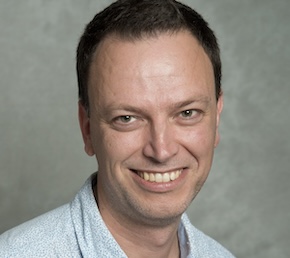Professor Michael Steel, recently appointed the Faculty Academic Lead for Diversity, Inclusion and Belonging, tells us about his career, his new role and his plans for the future.
1. Talk us through how you came to join Macquarie, and what you do here.
I joined Macquarie’s Photonics, Physics and Astronomy Department 16 years ago. I came from a software company where I wrote photonics tools for research and industry – many still in use – and before that, I did a PhD at the University of Sydney in theoretical nonlinear optics and postdocs in Auckland and New York City. I spent nearly a decade in teaching and research here, taking on various leadership roles and then in 2016, I was appointed Head of the Department of Physics and Astronomy and tasked with bringing Australian Astronomical Optics (AAO) into the University in 2018. After two post-COVID years back in a traditional teaching, research and service role, I’ve recently been appointed in a new role, as FSE Academic Lead in Diversity, Inclusion and Belonging, which occupies 40 per cent of my time.
 2. Tell us a bit about your research
2. Tell us a bit about your research
I am a theoretical physicist in photonics and quantum optics. That means I study light, from the global communication network of optical fibres, lasers and other components that enable the internet, all the way down to interactions with single photons - controlling light, one particle at a time.
We also have a large program on the interaction between sound and light, a field called Brillouin scattering after the French physicist Léon Brillouin who suggested this idea a century ago. This phenomenon was an academic curiosity until the invention of the laser, and although useful in a number of areas, was considered a rather unfashionable field until a decade ago, when Brillouin scattering was first achieved in integrated photonic devices. These optical chips, guiding light much like silicon chips guide electrons, allow much stronger sound-light interactions.
We’ve had a succession of ARC-funded projects exploring the fundamental nature of this interaction, its potential for improving microwave communications for mobile phones and national security, and the behaviour of single particles of sound. (Yes, in quantum mechanics, even sound waves can be particles!)
3. What does your new role involve?
I’ve recently been appointed the Faculty Academic Lead for Diversity, Inclusion and Belonging. This is one element of the faculty’s effort to continually improve our workplace culture and environment so that every student and staff member will truly feel a sense of safety and belonging here. That’s a pre-requisite for everyone to be able to succeed and be fulfilled in their work. Indeed, many staff and students in FSE with unique lived experiences have been working to improve diversity and inclusion in the faculty over years and even decades with fantastic achievements. Very frequently, this has been on their own time. The dedicated time for this role provides an opportunity to develop and implement broader strategies lock in process improvements in equitable hiring, mentoring and support, teacher training and other areas.
I’ll be looking for mechanisms to share successes across the faculty, and I’m currently meeting student and staff stakeholders, collecting their thoughts on where the challenges lie. For example, in parts of FSE, the gender ratio is very skewed. How do we then move to a place where those people who are a member of a group which is currently in a very significant minority still feel connected? We know these stubborn challenges around improving diversity and inclusion have barely shifted over decades in some disciplines, not least my own discipline of physics.
4. What are your plans for the rest of 2023?
Listening and gathering information from many people. Through previous roles, I’ve been lucky to build an extensive network across the University in different faculties and the centre, and this is rapidly growing through conversations with stakeholder student groups such as Women in Computing, the Stem Equity Alliance and the Queer Collective.
Next month will be about synthesising discussions into an action plan under the Faculty’s Strategic Framework, with concrete steps and timelines laid out. Some can happen quickly, while others like recruitment take years to bring significant change. I’m also excited about the launch this month of the new Faculty Leadership Shadowing program, which will offer both professional and academic staff an opportunity to jump-start their leadership and academic administration skills.
I'm also interested in methods for measuring and benchmarking progress. In Astronomy and Physics, we benefit from The Pleiades Awards, a formal benchmarking scheme for EDI achievement in astronomy and physics institutions across Australia. The recognition that comes with achieving the different levels of the awards is great, but the real value is the process of measuring and evaluating, to see where we’re making improvements and where we continue to struggle- because some things are really hard. A bit like a baby Athena SWAN/SAGE application, Pleiades cases are small enough for a single School and EDI committee to put together on a regular cycle, but rigorous enough to hold us to account and drive change. I’m really curious as to whether a similar scheme could work for other disciplines.